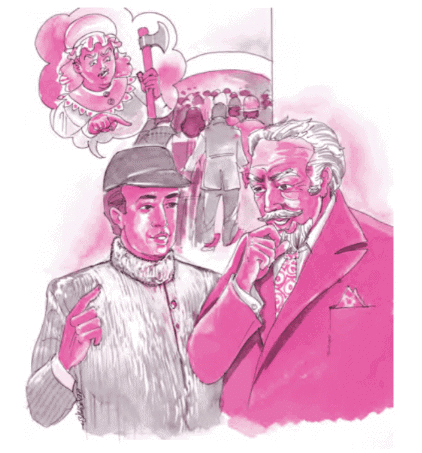NCERT Solutions for Class 9 English Moments Chapter 9 - The Beggar
Think about It
Q1. Has Lushkoff become a beggar by circumstance or by choice?
Ans: Lushkoff becomes a beggar due to circumstances rather than choice. He shares with Sergei that he was a village schoolteacher for eight years but lost his job because of intrigues and calumny. After losing his position, he fell into a state of destitution and poverty. Lushkoff expresses his desperation, stating he has not eaten for three days and cannot afford to travel to a job opportunity in Kaluga. His plea for help and willingness to perform menial tasks for Sergei indicate that his situation is a result of unfortunate circumstances, not a deliberate decision.
Q2. What reasons does he give to Sergei for his telling lies?
Ans: Lushkoff explains to Sergei that he lies out of necessity for survival. He reveals that when he shares his true situation, people are often unwilling to help him. Thus, he resorts to lying as a way to gain sympathy and support, particularly in his desperate circumstances. These falsehoods act as a strategy to enhance his chances of receiving assistance, as he grapples with challenges such as hunger and the need to travel for a potential job opportunity.
Q3. Is Lushkoff a willing worker? Why, then, does he agree to chop wood for Sergei?
Ans: No, Lushkoff is not a willing worker. He agrees to chop wood for Sergei not out of hunger or a desire for work, but due to his pride and shame. He feels trapped by his own words. His health has suffered from excessive vodka consumption, leaving him weak and without any motivation to work.
Q4. Sergei says, “I am happy that my words have taken effect.” Why does he say so? Is he right in saying this?
Ans: Sergei expresses his happiness because he sees that his words have had a positive impact on Lushkoff. Initially, Lushkoff was not eager to work, but after chopping wood and assisting Sergei with moving, he began to show a willingness to work. Sergei feels satisfied knowing that his guidance has helped Lushkoff move away from begging and towards a more productive life.
If Sergei had not intervened, Lushkoff might have continued to live on the streets, begging for survival. Therefore, Sergei's belief that his words have made a difference is justified.
Q5. Lushkoff is earning thirty five roubles a month. How is he obliged to Sergei for this?
Ans: Lushkoff is indebted to Sergei because, without Sergei's intervention, he might still be living as a beggar, identifying himself as a teacher or a student. By listening to Sergei, Lushkoff transformed his life; he became a notary and now earns thirty-five roubles a month.
Q6. During their conversation, Lushkoff reveals that Sergei’s cook, Olga, is responsible for the positive change in him. How has Olga saved Lushkoff?
Ans: Lushkoff attributes his transformation to Olga, Sergei's cook, who showed him great compassion. Initially, he was meant to chop wood for Sergei, but he did not do any of the work. Instead, Olga took on the task herself. While chopping wood, she would scold him, express her worries about his situation, and even cry for him. Her kindness went beyond just helping with physical tasks; it was her emotional support and genuine concern that truly affected him.
Lushkoff explains that her noble deeds and the sorrow she expressed for him played a vital role in his recovery. Olga's intervention, both in performing the physical labour and providing emotional backing, helped him move away from his struggles with alcoholism and poverty. Ultimately, her compassion inspired a significant change in his life.
Glossary:
- Intrigues: Secret plans or schemes; fascinating situations.
- Calumny: False accusations to damage reputation; slander.
- Deliberate: Intentional; to think carefully.
- Destitution: Extreme poverty; lack of essentials.
- Alcoholism: Addiction to alcohol.
|
180 videos|976 docs|124 tests
|
FAQs on NCERT Solutions for Class 9 English Moments Chapter 9 - The Beggar
| 1. What is the main theme of the story "The Beggar"? |  |
| 2. Who is the protagonist in "The Beggar" and what is his situation? |  |
| 3. How does Lushkoff change throughout the story? |  |
| 4. What role does kindness play in "The Beggar"? |  |
| 5. What lesson can readers learn from "The Beggar"? |  |

















